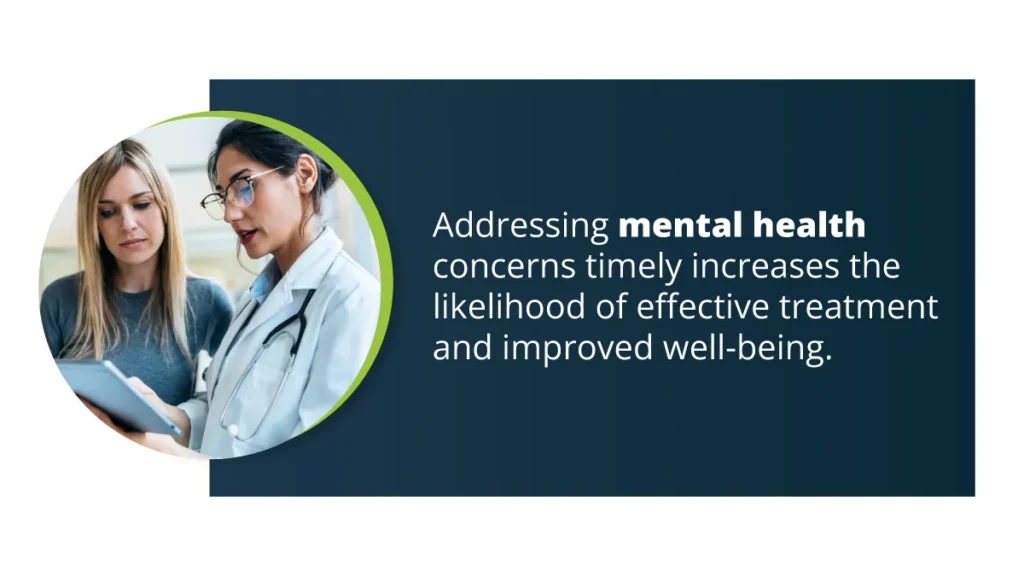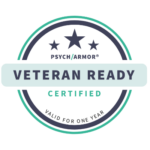Determining when to seek help for mental health is a critical aspect of self-care. If you constantly struggle with emotions, thoughts, or behaviors that impact daily life, it’s advisable to seek professional assistance.
Triggers may vary, but seeking help from mental health professionals is warranted when these challenges impact one’s ability to function optimally. This strategic intervention can provide the necessary support and tools to navigate and overcome such difficulties, promoting resilience and fostering a healthier mental state.

Key Takeaways
Timely intervention preserves individual well-being and fosters a conducive environment for sustained professional growth and effectiveness. Here’s what you need to know:
- Seek help when persistent feelings of sadness, anxiety, or changes in behavior impact daily life.
- If you sense your mental health is deteriorating, don’t hesitate to consult a professional for guidance and support.
- Addressing mental health concerns timely increases the likelihood of effective treatment and improved well-being.
Contact The Haven Detox-South Florida at (561) 328-8627 for information and personalized emotional support to foster long-term wellness.
How Mental Health Impacts Daily Life
Mental health significantly influences daily life, shaping how individuals navigate challenges, relationships, and overall well-being. The intricate interplay of thoughts, emotions, and behaviors can either propel individuals toward fulfillment or hinder their ability to cope with stressors.
A positive mental state fosters resilience, enabling effective problem-solving and adaptive responses to life’s complexities. Conversely, poor mental health can manifest as anxiety, depression, or other conditions that impede daily functioning. Concentration, productivity, and interpersonal connections may suffer, amplifying the burden of routine tasks.
When to Seek Help for Mental Health
Seeking help for mental health is crucial when facing challenges impacting their well-being.
Here are some signs and situations that may indicate the need to seek support:
Suicidal Thoughts or Intentions: If someone expresses thoughts of suicide or has a clear intent to harm themselves, immediate help is necessary. Contact emergency services or a crisis hotline.
Homicidal Thoughts or Intentions: In case someone expresses thoughts of harming others, seek help immediately. This is a serious concern that requires intervention to ensure safety.
Psychotic Symptoms: If an individual is experiencing hallucinations, delusions, or severe disorientation, it is important to seek emergency psychiatric care.
Severe Self-Harm: In cases of severe self-harm or attempts, immediate medical attention is necessary. Call emergency services or go to the nearest emergency room.
Chronic Symptoms and Long-Term Mental Health Issues
Chronic symptoms and long-term mental health issues can have a profound impact on an individual’s well-being, daily functioning, and overall quality of life.
Here are some common long-term mental health issues and chronic symptoms:
Persistent and Intense Emotional Distress: If feelings of sadness, anxiety, or hopelessness persist for an extended period and interfere with daily life, seeking professional help is essential.
Changes in Sleep Patterns: Persistent insomnia or excessive sleeping can be signs of underlying mental health issues. Consultation with a mental health professional is advised.
Difficulty Functioning in Daily Life: If mental health challenges make it hard to perform daily tasks, maintain relationships, or work, seeking support is crucial.
Substance Abuse Issues: If substance use is becoming a coping mechanism or exacerbating mental health problems, seeking help for both mental health and substance use disorders is important.
Isolation and Withdrawal: If an individual withdraws from social activities, loses interest in hobbies, or isolates themselves, it may indicate a mental health concern that requires attention.
Drastic Changes in Mood or Behavior: Sudden and extreme shifts in mood, behavior, or personality can be indicators of mental health issues.
Recurrent Physical Symptoms: Chronic headaches, digestive issues, or other physical symptoms without a clear medical cause may be related to mental health. Consultation with a mental health professional is recommended.
Trauma and PTSD: If someone has experienced a traumatic event and is struggling to cope, seeking therapy or counseling can be beneficial.
Family or Friends Express Concern: If loved ones notice changes in behavior, mood, or functioning and express concern, it may signal them to seek professional help.
Inability to Cope with Stress: If daily stress becomes overwhelming and coping strategies are ineffective, seeking support can provide valuable tools and resources.
Mental Health Treatment Options
There are various types of mental health help available, and the approach to treatment often depends on the specific needs and preferences of the individual.
Here are some common treatment options for mental health care:
Therapy
Therapy plays a pivotal role in mental health treatment, offering individuals a safe space to explore and address their emotional challenges and mental illnesses. Various therapeutic approaches, such as cognitive-behavioral therapy (CBT) and psychoanalysis, empower individuals to understand and manage their mental health conditions.
Medication
Psychiatric medications, including antidepressants, mood stabilizers, and antipsychotics, are commonly prescribed to alleviate symptoms of mental health crises. Medication can be an effective way of a comprehensive treatment plan, often used with therapy for optimal results.
Residential Treatment
For individuals requiring intensive care, residential treatment facilities provide a structured environment with round-the-clock support from medical doctors. These settings are beneficial for those facing severe mental health challenges that necessitate a more immersive and focused therapeutic approach.
Peer Support and Self-Help
Peer support and self-help groups offer unique assistance, providing young people or teens with shared experiences and a platform to connect and exchange coping strategies. These settings foster community and understanding, contributing to participants’ overall well-being.
Frequently Asked Questions (FAQ)
When should you seek help with a mental disorder?
Seek help for a mental disorder when your daily life is significantly impacted. If emotions, thoughts, or behaviors interfere with work, relationships, or personal well-being, professional assistance is crucial.
Early intervention is key. Don’t hesitate to consult a mental health professional, doctor, or psychiatrist if you’re struggling to cope or experiencing persistent distress.
How do I know when to go to the doctor for mental health?
If you or a loved one are experiencing specific mental health problems or noticing warning signs like persistent sadness and other troubles, seek support from a primary care doctor, therapist, or counselor. Contact close friends, family members, caregivers, or a support group for assistance.
For young adults, school or university resources can help. Prioritize self-care and consider taking early help for mental health care.
Why does it take so long to get mental health help?
The demand for mental health services often exceeds the available resources, leading to longer wait times. Limited accessibility to mental health professionals, stigma, and systemic issues contribute to delays.
Urgency varies, but advocacy for improved mental health infrastructure is important to address mental health disorders or challenges and enhance timely access to care.
Reclaim Your Mental Wellness With The Haven Detox-South Florida
Take the first step towards a healthier future with The Haven Detox-South Florida.
Overcome mental health challenges with our comprehensive mental health treatment program, designed to address various aspects of mental health disorders, including anxiety, depression, addiction, and substance use disorders.
In addition, our residential treatment program is tailored to your unique needs, where dedicated staff employ evidence-based therapies and personalized counseling to help you build resilience and regain control of your life.
Rediscover hope, healing, and a renewed sense of self. Contact us at (561) 328-8627 today and embark on your journey to mental wellness.






